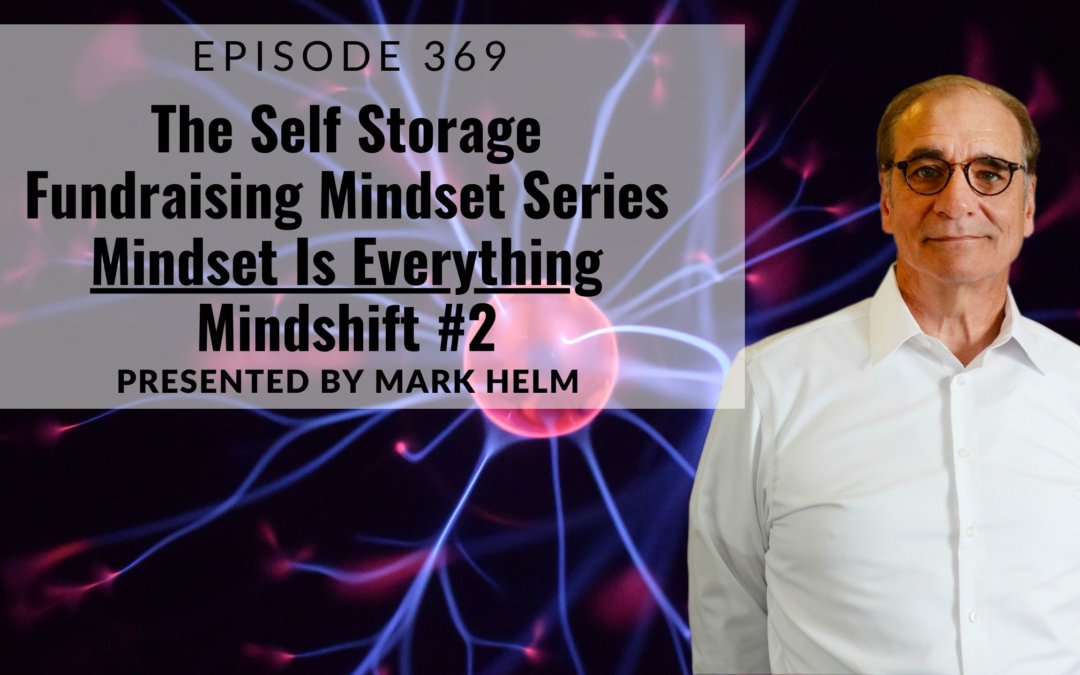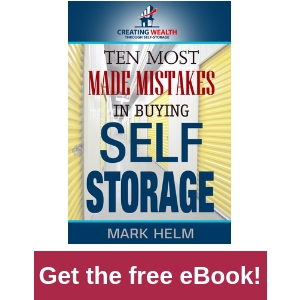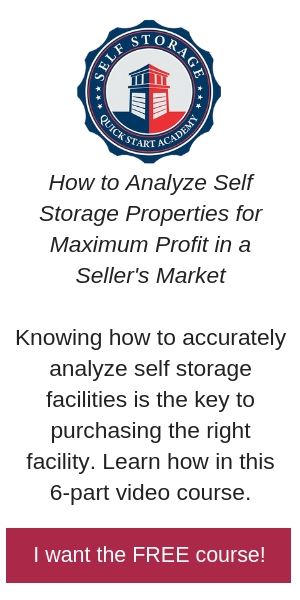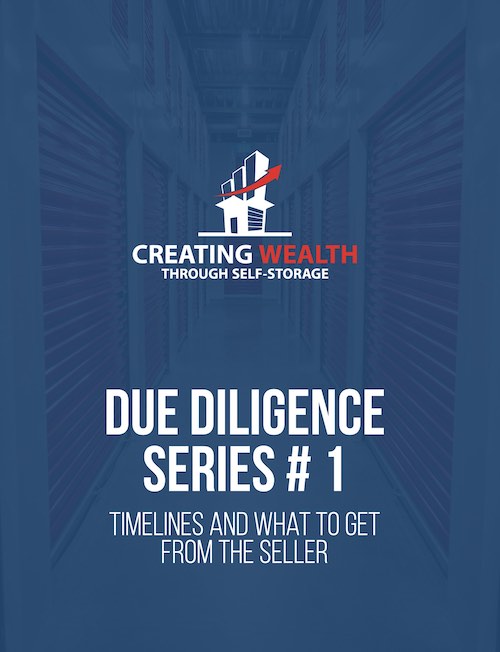Last week I introduced the idea that no matter what the industry, or niche in any industry, the more I hang around people who are at the top of their game, the less they discuss tactics and strategies, and the more they discuss the breakthrough they had in their thinking.
And I introduced the idea that if you are going to be raising money for your self storage project before you get too far down the road of learning what to do, it is always powerful to start by expanding your mind or shifting your mindset, so this larger world of fundraising has a chance.
Look, if you are a human and you have never raised money before for a real estate project or a self storage project, you are going to bump up against any limiting beliefs you may have, conscious or unconscious, about money, yourself, and your success.
Mostly unconscious beliefs.
We all have them.
I suggested three mindset shifts I think might be most relevant to all, or most, small self storage investors jumping into the world of self storage fundraising.
The first was what I called creating a shift from “I am a self storage person who has to raise money to do the deal I want to do to I AM A FUNDRAISER.
You can access last week’s episode here.
Mindshift Two
Now I want to discuss what I consider the second shift all of us, to some degree or another, must tackle…
Altering Your Relationship To Money.
What is your relationship to money?
Does raising $2 million seem like a lot to you?
Most of us have some disempowering ideas about money.
This is a huge topic, and I could write a book on it. But let’s keep it fairly simple for this episode.
First of all, what is money?
That may seem like a dumb question. But really, what is it?
Fundamentally, I think money is an agreement.
There is an agreement in today’s world that money has specific values, and the world agrees to exchange goods and services for money based on the agreed “value.”
But consider money is really energy.
Most money has little to no physical existence. According to Market Watch, 8% of all money on planet earth is in physical form, and the little in form has no intrinsic value. Most all “money” exists as digital information in computers.
Since nations went off the gold standard, the money in the world has increased exponentially, and almost all of it has no physical form.
So, try on the belief that money is actually energy. It is an energy that the world has an agreement with.
We mostly relate to it like it is a thing. A limited thing that we are always trying to get more of.
But what if money really is just energy?
Do you know what else is energy?
Your thoughts.
I can measure the energy of your thoughts with an EEG machine.
The challenge is, for most of us, even if we acknowledge money is energy, we don’t relate to it that way in our day-to-day lives.
Now the reality is you do not have to alter who you are with money.
However, if raising $2 million for a self storage deal sounds like a lot to you, and for most of us, it will, I suggest you will need a new relationship with money.
Not necessary that your old one is wrong and bad. It is just insufficient for this new game you are playing. If it wasn’t, $2 million would seem like a drop in the bucket. For many fundraisers, $2 million is.
I suggest it will require you to know yourself as a different person with money.
When we have been worried about money most of our lives, or about having enough money, or worried about not losing it, all of the emotions that go with these experiences put us in survival mode.
Many of us grew up in an environment around people who were in survival mode all the time concerning money.
Many of us, when we first started dealing with money, didn’t have a lot of it and immediately went into survival mode.
This has become the “normal” way of dealing with and experiencing money.
It might not seem comfortable, but for many of us, this is the state of normalcy with money.
Thoughts create a chemical reaction in our brain, a chemical reaction around survival. Our body not only gets used to this normal feeling but becomes addicted to it. Our body can become physically addicted to cortisol, the chemical created by the body when in survival mode.
For many of us, we unconsciously attract and create situations and experiences in our relationship to money to feed the unconscious addiction we have to this way of being.
No matter if we are aware of it or not, in survival mode, knowing what to expect has a high value.
The unknown, even if it means more money, is threatening and scary to the ego.
Also, for many of us, money is bad. We may not be conscious of this as a belief system, but it was a conversation we inherited.
If you have not consciously removed this belief, it will most likely be there in some form or fashion.
And most of us believe money is a scarce commodity, and if I get some, that means someone else didn’t. That would make me a bad person.
Good people don’t do that.
Now I know your knee-jerk reaction is, “That is not me.”
Well…good. But consider it is. There is power if you do.
A New Relationship to Money
Let’s create a new relationship with money.
Look back on your life now. How have you related to money? Again, the traces and evidence of a scarcity mindset are detected in the words and thoughts we have about money. Here are some examples.
- I can’t afford that.
- There isn’t enough to go around.
- I am poor.
- Rich people are bad.
- A rich person most likely did unethical and bad things to get that much money.
- The root of all evil is money.
And on and on.
What did your parents, or the people who raised you, say and tell you about money?
How did they act with and around money?
Has money been an issue for you in your life?
Pull out the story you wrote about your relationship with money and go to a deeper level.
It is very powerful to distinguish where we are weak in our relationship with money and own it.
There is real power there because if we do not distinguish any disempowering thoughts (i.e., beliefs) about money and our relationship to it, that which is undistinguished will control us from the subconscious.
By distinguishing and owning it, we can choose to replace that belief system and take different actions.
Act Our Way Into a New Relationship With Money
Believe it or not, sometimes we just need to act like we have a different relationship with money. Then the new, consciously created belief system will follow.
This can especially work in the arena of fundraising.
Jim Rowan, Tony Robbins (and countless others) mentor, used to say, “I can tell your net worth and character by looking at the five people you spend the most time with.”
If raising $2 million or asking someone for $100,000 seems like a stretch, then you and most likely the people you hang around think the same.
Try meeting and hanging around people who think $10 million and asking for $500,00 may seem like a lot.
I know, easier said than done, But the idea is to expand who you know and hang around with.
You see, if you think raising $2 million is hard, you bring that belief into every conversation you have with potential investors.
There was a time with $100 or $10,000 seemed like a lot of money to you. Now your view of what is a lot has altered.
It can still expand.
One thing I have noticed is when people who are raising funds for the first time, or people who are out of their comfort zone in dollar amounts, when presenting opportunities, talk to people about the way they relate to money.
Try talking to investors or potential investors not about how you relate to money but the way they relate to money.
And how is that?
You will know when you interact with them. Not present your deal but hang with them. Talk with them. And most importantly, listen to them.
The shift I see when people alter their relationship to money is something in the likeness of, “I am seeking your money to do a deal to I have a solution for you that solves a problem you have.”
Integrity
We so far have talked about two ways one could approach altering one’s relationship to money. The first is distinguishing sacristy mindset beliefs. The second is acting our way into a new relationship with money.
Let’s discuss one third and powerful concept…restoring integrity with money.
There are many ideas and concepts about what integrity is. Most of the time, the belief systems and conversations we inherited relate to integrity as good and no integrity as bad. If you have integrity, you are a good person. If you don’t have integrity, you’re a bad person.
There is nothing wrong with these concepts, but there is little power in them.
I am not that interested in being a “good” person. I am very interested in having power, so I am very interested in having integrity.
Try to relate to integrity as “workability.”
If a bicycle tire has all the spokes in place, that wheel has integrity. It can work at maximum efficiency.
If some of the spokes are missing and others are not tight, there is little integrity in the wheel. Thus, it will not perform well.
So, when I was starting out expanding my relationship with money, my training was first to restore integrity in how I was with money before I sought out and dealt with other people’s money.
Again, nothing that I was doing was necessarily “bad,” just where my integrity was put.
I was coached not to, with a wave of a hand, state that I was not out of integrity with money. We all are to some degree.
I was told to begin to restore integrity with money where I could see it was out. Depending on your relationship with money, that will determine how much integrity there is to restore.
Do you say you are going to pay a bill or pay someone, and then you are late? Do you track your account balances and know how much money you have in your accounts?
Do you pay your credit cards off monthly?
Are you way behind in payments? Do you owe taxes?
It may seem silly to think like this, but these are some of the basics that keep us from having power with money, and if you have little power with money, it is hard to relate powerfully to people who do.
Many people do their best to avoid counting or knowing how much money they really have. Some people hoard money like it is something that will run away. Others spend money like they have to get rid of it as fast as they get it.
All of these point to a lack of power with money. All of these point to being out of integrity with money.
We are all in different places concerning money, and no matter where we are, there is room to increase our power.
Remember, no matter where your integrity may be around money, it is not personal to you. You are not unique at all around where you may be out of integrity concerning money.
It just supports us in developing power with money and altering our relationship with it.
Conclusion
Mindshift Two is consciously altering your relationship with money, expanding it.
Anytime we step up and play a larger game in life where money plays a central role, like fundraising, one place to begin is to distinguish limiting beliefs around money, restore integrity in the area of money, and then act our way into a new relationship with it.



